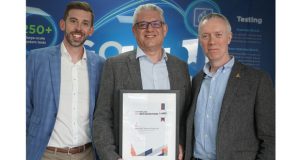 The International Facility Management Association (IFMA) has published its ‘Experts’ Assessment, Vol. 2: Future working environments and support functions toward 2030’, providing an in-depth analysis of what the FM industry has learned since the first Experts’ Assessment study was conducted in 2020, and how changing organisational priorities are shaping the future of the built environment and FM roles.
The International Facility Management Association (IFMA) has published its ‘Experts’ Assessment, Vol. 2: Future working environments and support functions toward 2030’, providing an in-depth analysis of what the FM industry has learned since the first Experts’ Assessment study was conducted in 2020, and how changing organisational priorities are shaping the future of the built environment and FM roles.
The report, which assesses insights provided by 222 subject matter experts (SMEs) from around the world, aims to build industry resilience and help FM professionals prepare for significant shifts in how organisations operate.
Five thematic sections synthesise SMEs’ perspectives on:
- Facilities in demand toward 2030
- Technology, work and workforce development
- Workplace management and strategy
- Environmental, social and corporate governance (ESG)
- Facility management in 2030
IFMA’s 2020 report, ‘The Experts’ Assessment: The Workplace Post-COVID-19,’ was the result of discussions among 248 global SMEs about the pandemic’s long-term impacts on the workplace and how FMs would adapt to a new world of work. Volume 2 revisits the challenges, projected effects and recommended actions outlined two years ago, examining choices made and lessons learned, identifying the implications for future work environments and support functions.
FMA President and CEO Don Gilpin, commented: “The subject matter experts who contributed to this study are industry leaders whose foresight and well-considered actions have sustained their organisations through unprecedented change. Understanding the decisions they’ve made to adapt and prepare their organisations for the future will help any FM gain clarity in forming their own strategies, as well as a solid base from which to gain buy-in on projects and policies that will mean the difference between sink or swim.”
Volume 2 identifies the most crucial focus areas for resilience, both for FM professionals and their organisations. It shows that facility managers face several new realities requiring new mindsets, business models and technologies. With remote and hybrid work becoming the norm and organisations still struggling to entice workers back to the office, it is increasingly important for FMs to create more experiential spaces.
Laurie A. Gilmer, Chair of IFMA’s Global Board of Directors, said: “FMs are no strangers to change. We are attentive to varying conditions in our facilities and the business world. We plan for possible scenarios so that we are ready to pivot for the safety and productivity of our people and the endurance of our organisations. To be fully prepared, we must be fully informed. The Experts’ Assessment is a shining example of how our industry has remained forearmed and flexible, supported by IFMA’s initiative in identifying emerging trends, preparing FMs for the impacts and guiding us through challenges with critical information and insights.”
IFMA will be will be joined by a panel of industry experts for a live webinar on 8 February 2023 to explore and contextualise the findings of the survey. To register for the event click here.
FMJ in conjunction with Grundon Waste Management is pleased to launch the 2023 waste management and recycling survey which examines the ways in which FMs approach their waste management responsibilities.
In this, the sixth year for the annual appraisal, we know there is a greater opportunity than ever for FMs to reappraise their waste and recycling operations and help their organisations meet the growing pressure to achieve ESG goals.
We want to learn how FMs have adapted to the legislative, economic and societal changes of the past year and how they plan to meet the latest waste and recycling targets.
In this survey we’ve posed a series of questions which include insights into FMs’ waste management strategy and targets, how they’re moving towards zero waste targets, and the importance of not just meeting compliance targets but also ESG goals.
The results of the 2023 survey will be published in FMJ magazine and form the basis of a white paper co-written by FMJ and the experts at Grundon on how to approach waste and recycling strategies.
To take part click here.




